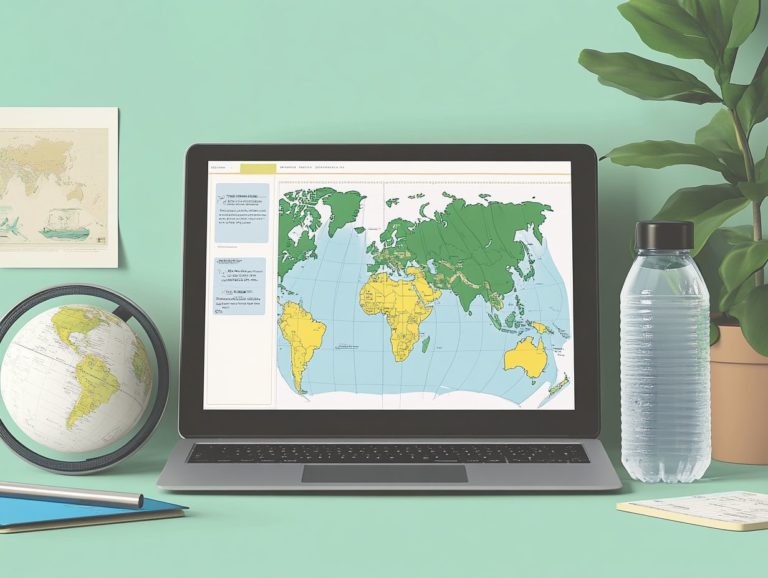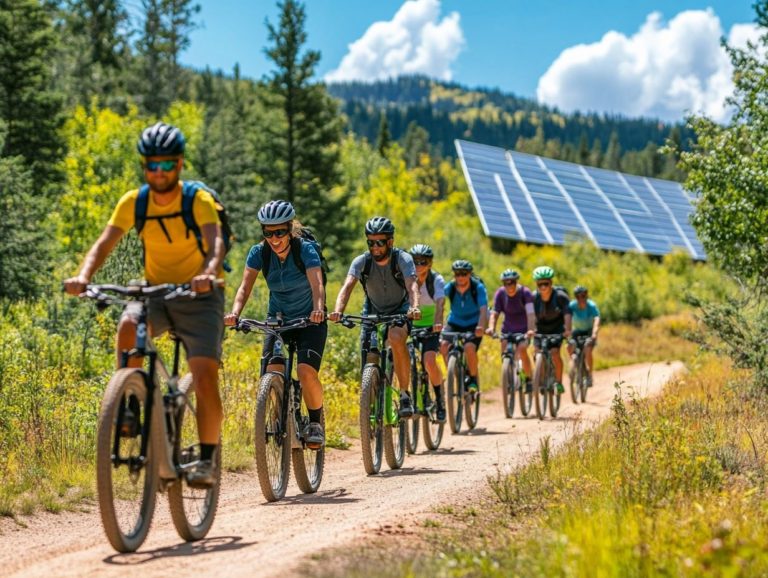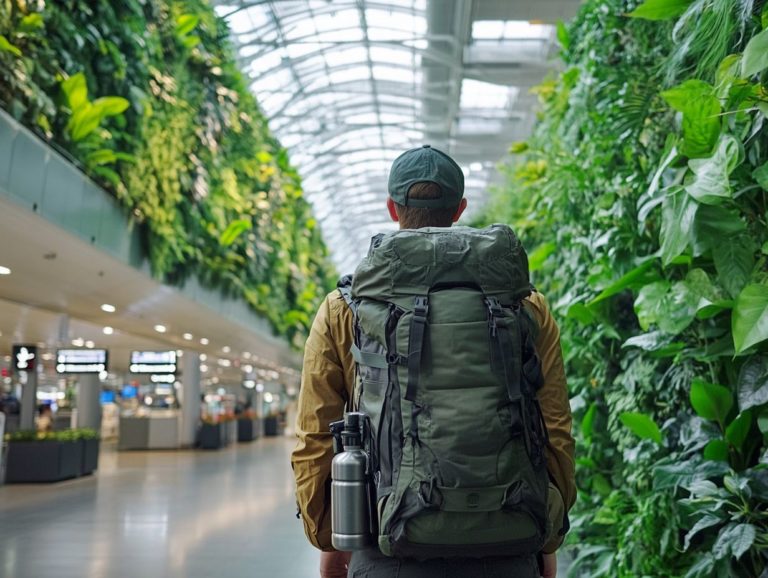Tips for Sustainable Travel in Nature
Join us on this journey towards saving our planet while you travel! Sustainable travel in nature transcends mere trendiness; it s an essential practice for preserving our planet’s stunning landscapes and fragile ecosystems.
This discussion delves into the importance of protecting these natural environments. We provide valuable insights on how to plan trips that minimize your impact.
You ll find essential tips on selecting sustainable destinations, packing thoughtfully, and embracing eco-friendly habits throughout your travels.
Learn how to continue supporting conservation efforts long after your adventures conclude. Engage in making a meaningful difference while exploring the great outdoors.
Contents
- Key Takeaways:
- Why Sustainable Travel in Nature Matters
- Planning for Sustainable Travel
- Practicing Sustainable Habits During Travel
- Continuing Sustainable Practices After Travel
- Ways to Support Conservation Efforts
- Incorporating Sustainable Habits into Daily Life
- Frequently Asked Questions
- What are some general tips for sustainable travel in nature?
- How can I reduce my carbon footprint while traveling in nature?
- What should I do to minimize my impact on the environment while camping?
- Are there any specific eco-friendly activities I can participate in while traveling in nature?
- How can I support local communities while traveling in nature?
- What should I do if I witness any harmful or illegal activities in nature?
Key Takeaways:
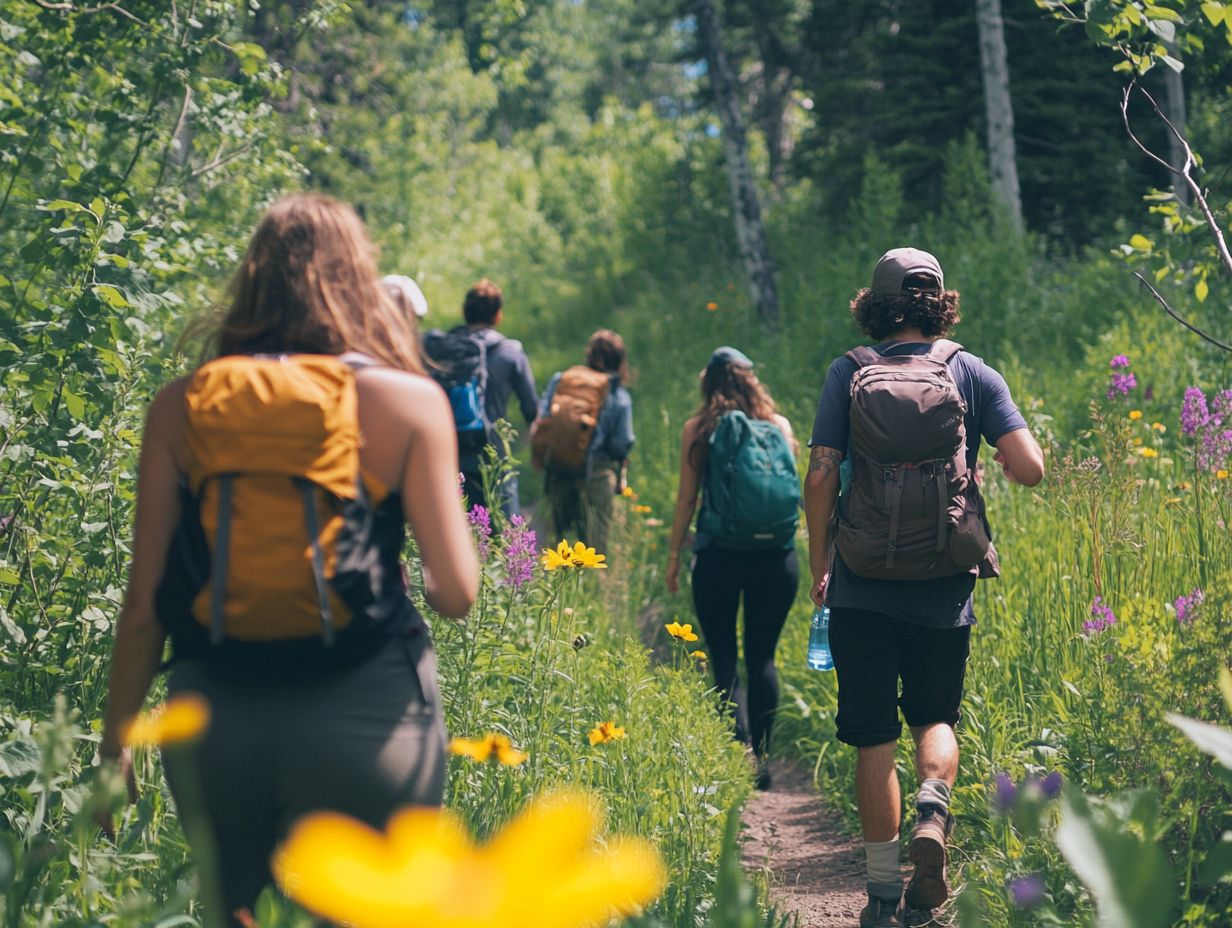
- Choose sustainable destinations by researching and supporting local communities.
- Minimize waste and be mindful of wildlife while traveling in nature.
- Continue sustainable practices after travel by supporting conservation efforts and incorporating habits into daily life.
Why Sustainable Travel in Nature Matters
Sustainable travel in nature is crucial. It safeguards our planet s delicate ecosystems while uplifting local communities and economies through eco-friendly tourism practices.
By minimizing the amount of carbon dioxide you produce and participating in conservation efforts, you can play a vital role in preserving stunning natural environments think of the breathtaking landscapes in Hawaii, Dubrovnik, and Palau for future generations to cherish.
This mindful approach not only deepens your appreciation for local cultures but also encourages the use of low-impact accommodations and energy-efficient lighting. This creates a harmonious balance between travel and environmental stewardship.
The Importance of Protecting Natural Environments
Protecting natural environments is essential for maintaining biodiversity and combating climate change through sustainable practices and environmental initiatives.
This commitment safeguards the delicate balance of ecosystems. It also significantly supports local economies and communities.
Around the world, various conservation efforts like the creation of protected marine areas and the restoration of forests illustrate the tangible benefits of biodiversity. Take, for instance, the initiatives in the Amazon rainforest aimed at restoring native species and promoting eco-tourism.
These efforts boost local economies while healing our planet. By adopting sustainable agricultural methods, you can enhance soil health and improve water quality, benefiting both the planet and your livelihood.
Ultimately, your collective effort towards these goals can produce lasting positive impacts. This ensures a healthier earth for future generations.
Planning for Sustainable Travel
Planning for sustainable travel means embracing green travel tips and actively championing sustainable tourism initiatives.
By prioritizing eco-friendly options and supporting local businesses, you can significantly reduce your environmental impact. Engaging with carbon offset programs further enhances your commitment, ensuring that your travels contribute positively to the world around you.
Researching and Choosing Sustainable Destinations
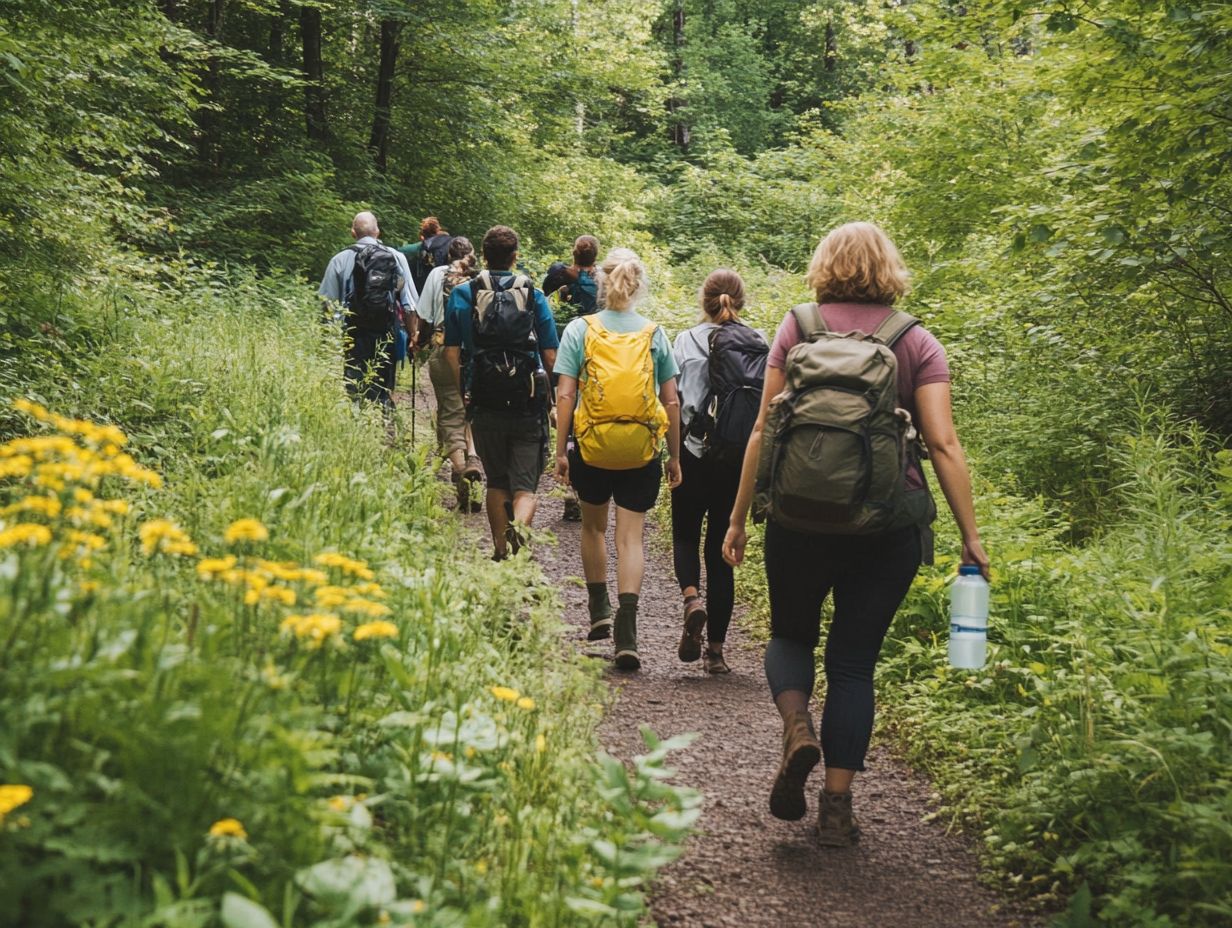
When you re researching and selecting sustainable destinations, it s essential to prioritize eco-friendly tourism options that boast certifications like Green Seal and EarthCheck. These certifications are your trusted allies, ensuring that the places you choose adhere to genuine sustainable tourism practices.
These badges of honor serve as reliable indicators, helping you identify destinations committed to minimizing their environmental impact while celebrating local culture. By diving deep into your research, you ll uncover valuable insights on how these locations implement practices such as waste reduction, energy conservation, and supporting local economies.
By choosing to visit places that prioritize these initiatives, you not only indulge in authentic experiences but also make a positive contribution to the communities you explore. This way, your adventures leave a lasting legacy of benefit, rather than a footprint of harm.
Start planning your sustainable trip today and be a part of the change!
Packing and Preparing for Sustainable Travel
Packing for sustainable travel can greatly minimize your environmental impact. By including essentials like a reusable water bottle, multi-purpose toiletries, and biodegradable alternatives, you’re already on the right path.
Preparation is crucial before you set off on your adventure. Selecting durable items that serve multiple functions not only streamlines your luggage but also reduces waste.
Consider making bulk purchases of eco-friendly products, such as natural soaps and shampoos. This not only cuts down on plastic but also gives you the opportunity to explore charming local markets.
Don t forget to think about your transportation choices as well. Try using public transport for an exciting travel experience! Opting for rail or bus travel can significantly reduce carbon emissions, enhancing both your travel experience and your sense of purpose.
The choices you make can lead to a greener, more meaningful adventure.
Practicing Sustainable Habits During Travel
Practicing sustainable habits while traveling means you re committed to cutting down on trash, supporting local communities, and making environmentally conscious choices.
Consider using public transportation or hybrid vehicles to enhance your travel experience while minimizing your ecological footprint, which refers to the impact your actions have on the environment.
Reducing Waste and Supporting Local Communities
Reducing waste while traveling not only minimizes your environmental impact but also enhances your travel experience. It fosters meaningful interactions with local culture and embraces sustainable tourism practices.
When you choose to dine at family-owned restaurants instead of large chains, you get to savor authentic dishes while actively supporting local economies.
By cutting down on single-use plastics, like water bottles and shopping bags, you help preserve the pristine environments that many destinations are known for.
Engaging with local artisans and participating in workshops cultivates a genuine appreciation for the culture. It also promotes the conservation of unique traditions.
Contributing to conservation initiatives allows you to play a part in preserving the natural beauty that initially captivated you, creating a deeper connection to the places you explore.
Responsible Wildlife Viewing and Activities

Responsible wildlife viewing and activities are essential components of sustainable travel. They emphasize conservation efforts and eco-friendly practices that safeguard wildlife and their habitats.
By opting for eco-conscious tourism operators, you actively support initiatives that preserve ecosystems and uplift local communities. Collaborating with knowledgeable guides ensures that your presence does not disrupt the animals or their environment.
Engaging in activities that foster awareness and education ignites a passion in others to cherish and protect our natural resources.
In the end, making informed choices not only enriches your travel experience but also significantly contributes to cultivating a global culture of respect for wildlife and its preservation, especially when considering traveling off-grid.
Continuing Sustainable Practices After Travel
Continuing sustainable practices after your travels is crucial for supporting conservation efforts. By integrating sustainable habits into your everyday life like cutting down on trash and applying green travel tips to your daily routines you help create a healthier planet!
It’s a seamless way to ensure that the positive impact of your travels extends well beyond your trip. Start your sustainable journey today!
Ways to Support Conservation Efforts
You can support conservation efforts in a variety of impactful ways. Whether it s donating to environmental initiatives, volunteering with local organizations, or advocating for sustainable practices that make a difference, every small step you take today can help protect our planet!
In addition, you have the opportunity to engage with local environmental groups dedicated to environmental protection. Participating in community clean-up events not only helps clear litter and debris from natural habitats but also cultivates a spirit of teamwork and shared responsibility among participants.
By raising awareness about ongoing environmental campaigns through social media or local gatherings, you can inspire others to take action. This amplifies the collective impact of everyone s efforts. Ultimately, every small step you take contributes significantly to the larger goal of preserving the planet for future generations.
Incorporating Sustainable Habits into Daily Life
Incorporating sustainable habits into your daily life is essential for becoming an environmentally conscious individual. It s all about emphasizing waste reduction and embracing eco-friendly practices.
By making mindful choices like reducing water usage through shorter showers or harnessing rain barrels for your garden you can significantly lessen your ecological footprint. Recycling is another impactful strategy. It helps divert materials from landfills and supports a system where we reuse materials instead of throwing them away right in your community.
Choosing eco-friendly products, whether they are biodegradable cleaning supplies or sustainably sourced foods, benefits the planet. This also highlights the importance of sustainability in tourism. As more travelers seek eco-conscious experiences, adopting top sustainable travel practices showcases your commitment to preserving nature for future generations. Ultimately, you can make a positive impact on the travel industry.
Frequently Asked Questions
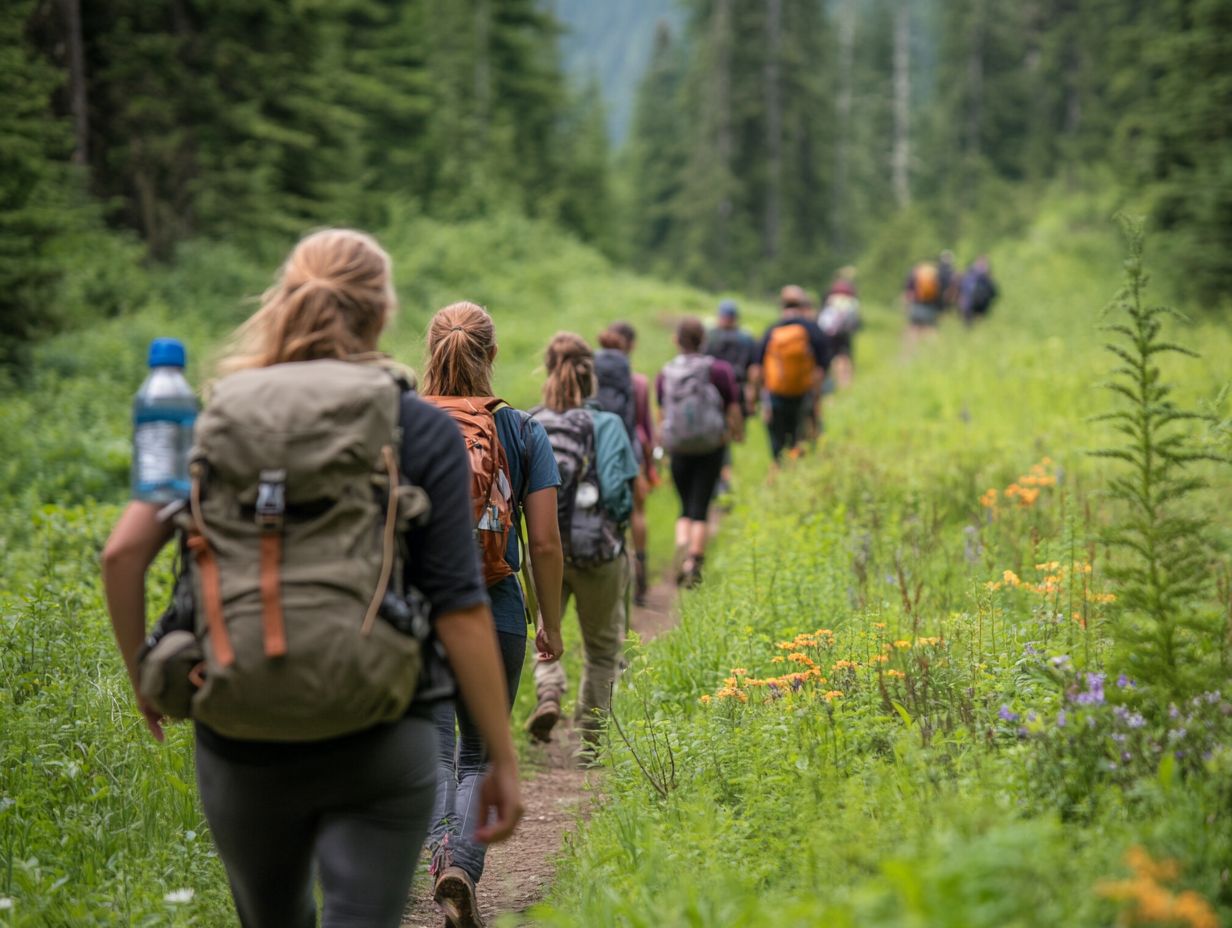
What are some general tips for sustainable travel in nature?
Some general tips for sustainable travel in nature include packing light, using reusable water bottles and containers, minimizing waste, and respecting wildlife and local cultures.
How can I reduce my carbon footprint while traveling in nature?
To reduce your carbon footprint while traveling in nature, consider using alternative modes of transportation such as biking or taking public transportation. Stay in eco-friendly accommodations and support local businesses.
What should I do to minimize my impact on the environment while camping?
To minimize your impact on the environment while camping, properly dispose of trash and waste. Use biodegradable products and leave the campsite as you found it.
Are there any specific eco-friendly activities I can participate in while traveling in nature?
Yes! There are many eco-friendly activities you can participate in while traveling in nature. These include hiking, birdwatching, wildlife conservation projects, and supporting sustainable tourism initiatives.
How can I support local communities while traveling in nature?
Support local communities and make a difference! Buy locally made products, hire local guides, and respect local customs and traditions. You should also consider donating to organizations that work towards sustainable development in these communities.
What should I do if I witness any harmful or illegal activities in nature?
If you witness any harmful or illegal activities in nature, report it to the appropriate authorities or organizations. It is important to take action to protect the environment and preserve it for future generations.



